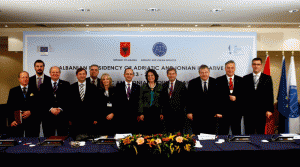The Stakeholder Conference on the EU Strategy for the Adriatic - Ionian Region, a two day event co-organised by the European Commission and the Greek Presidency of the Council of the European Union, opened yesterday (6.2.2014) in Athens.
Greek Prime Minister Antonis Samaras, Deputy Prime Minister and Foreign Minister, Evangelos Venizelos, Minister of Development and Competitiveness Kostis Hatzidakis, Deputy Foreign Minister Dimitris Kourkoulas, Commissioners for Regional Policy and for Maritime Affairs and Fisheries, Johannes Hahn and Maria Damanaki, and ministers from all countries participating in the initiative for the Adriatic - Ionian Region (Italy, Croatia, Slovenia, Albania, Bosnia - Herzegovina, Montenegro and Serbia) addressed the event on the first day.
In his address, Prime Minister Antonis Samaras noted the large potential for economic growth in the Adriatic - Ionian Region, structured around four pillars:
• cutting-edge sectors, such as Shipping, Shipbuilding and Logistics,
• the development of tourism across the Adriatic and the Ionian Region, which can become a leading international destination
• the enhancement and promotion of the natural environment, of the economy and the scientific research related to the environment, and
• the emergence of the Adriatic as an important trade route for the transportation of goods and energy in all directions
On the issue of energy in particular, the Prime Minister stressed that the Adriatic contains significant energy reserves, and therefore making use of the Exclusive Economic Zone, as provided by international law, can ensure greater energy independence and further diversification of energy sources. Moreover, the Prime Minister reminded the audience, the implementation of TAP, the pipeline cutting across the Adriatic and carrying natural gas from Azerbaijan to Italy through Greece and Albania, has begun as of last year.
Deputy Prime Minister and Foreign Minister Evangelos Venizelos, referred inter alia to the 16th Ministerial Session of the Adriatic – Ionian Initiative held yesterday (6.2.2014) in Athens and the adoption of the “Declaration of Athens” following close cooperation between the Greek Presidency of the EU, the Albanian Chairmanship of the Initiative, and the contributions of Commissioners Johannes Hahn and Maria Damanaki. From now on, our goal and our priority, said Mr Venizelos is to highlight this area as a large region, a mega region of the European Union. He also emphasised the huge political significance for the Adriatic – Ionian Initiative of marine spatial planning and the identification of sea uses as a first condition for safe investments.
In his address, Minister of Development and Competitiveness, Kostis Hatzidakis, underlined the importance of the Strategy for the Ionian and Adriatic Region, especially in terms of development, as it aims:
• to support innovation, entrepreneurship and smart specialization with blue growth actions such as aquaculture and new products with designation of origin
• to guarantee economies of scale in infrastructure and network connectivity for the region, in both transport and energy
• to help protect and enhance the region's environment, particularly the marine, with an emphasis on biodiversity and pollution reduction
• to boost the attractiveness of manufacturing, by promoting tourism and highlighting cultural heritage
In short, Ηadzidakis said, the strategy needs to highlight the comparative advantages of the areas in question and enhance their competitiveness.
Deputy Foreign Minister, Dimitris Kourkoulas noted that the objectives of the EU Strategy for the Adriatic and Ionian coincide with the triptych of the top priorities of the Greek Presidency, i.e., growth, jobs and cohesion. At the same time, said Mr Kourkoulas, the Strategy develops on the basis of and around a marine axis, and as is known, maritime policy is the horizontal thematic priority of the Greek Presidency. This coincidence of goals and priorities between the Greek Presidency and the Strategy also offers the means to enhance and promote the Strategy.
Addressing the same event, Commissioner Johannes Hahn noted that “the new strategy will not magic away economic disparities, or political challenges. But I believe it can make a significant contribution by offering new ways for candidates and potential candidates to work alongside EU member states. It is a chance to build capacity, and to forge links at all levels: between politicians, between technicians, between entrepreneurs and between academics.” Based on acquired experience from similar European projects, he called upon participants to start with pragmatic, realistic and measurable common objectives, to demonstrate that they can deliver results and then increase the scope of the strategy. In this respect he identified four pillars for the new strategy: Blue Growth, regional connectivity, quality of the environment and sustainable tourism.
“At the EU level, we are doing our bit by identifying bottlenecks and proper incentives for the most promising sectors and by opening up funding opportunities for the next seven years. We have also put forward a legislative proposal on Maritime Spatial Planning, which will help our countries do their maritime investment planning in a context of legal and environmental certainty”, Commissioner Maria Damanaki said, adding that it will be up to individual countries, regions and maritime stakeholders to follow this up with concrete projects, driven by sustainability.
For more information on the event see: Greek Presidency events & the Commission’s website








